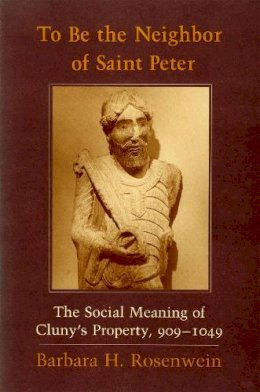10%OFF
Stock image for illustration purposes only - book cover, edition or condition may vary.
Emotional Communities in the Early Middle Ages
Barbara H. Rosenwein
FREE Delivery in Ireland
Description for Emotional Communities in the Early Middle Ages
Paperback. Num Pages: 248 pages, 8. BIC Classification: 3H; HBJD; HBLH; JHBK. Category: (G) General (US: Trade). Dimension: 228 x 154 x 16. Weight in Grams: 352.
"With this book Barbara Rosenwein has made the emotions an essential component of our approach to the changing social history."
― Jacques Le Goff
Proposing that people lived (and live) in "emotional communities"—each having its own particular norms of emotional valuation and expression—Barbara H. Rosenwein here discusses some instances from the Early Middle Ages. Drawing on extensive microhistorical research, as well as cognitive and social constructionist theories of the emotions, Rosenwein shows that different emotional communities coexisted, that some were dominant at times, and that religious beliefs affected emotional styles even as those styles helped shape religious expression.
This ... Read morehighly original book is both a study of emotional discourse in the Early Middle Ages and a contribution to the debates among historians and social scientists about the nature of human emotions. Rosenwein explores the character of emotional communities as discovered in several case studies: the funerary inscriptions of three different Gallic cities; the writings of Pope Gregory the Great; the affective world of two friends, Gregory of Tours and Venantius Fortunatus; the Neustrian court of Clothar II and his heirs; and finally the tumultuous period of the late seventh century. In this essay, the author presents a new way to consider the history of emotions, inviting others to continue and advance the inquiry.
For medievalists, early modernists, and historians of the modern world, the book will be of interest for its persuasive critique of Norbert Elias's highly influential notion of the "civilizing process."
Rosenwein's notion of emotional communities is one with which all historians and social scientists working on the emotions will need to contend.
Show Less
Product Details
Publisher
Cornell University Press
Place of Publication
Ithaca, United States
Shipping Time
Usually ships in 7 to 11 working days
About Barbara H. Rosenwein
Barbara H. Rosenwein is Professor of History at Loyola University Chicago. She is the author of Negotiating Space: Power, Restraint, and Privileges of Immunity in Early Medieval Europe and To Be the Neighbor of Saint Peter: The Social Meaning of Cluny's Property, 909-1049, editor of Anger's Past: The Social Uses of an Emotion in the Middle Ages and coeditor of ... Read moreMonks and Nuns, Saints and Outcasts: Religion in Medieval Society, all from Cornell. She is also the editor of the Cornell series Conjunctions of Religion and Power in the Medieval Past. Show Less
Reviews for Emotional Communities in the Early Middle Ages
"This is a landmark book, not only for the early middle ages but also for the emerging field of the history of emotions. Barbara H. Rosenwein evaluates with superb intelligence the strengths and weaknesses of the various methods that have been applied in this field, and fashions an approach of her own that will serve as a useful model for ... Read moremany other researchers. Using this carefully constructed method, she is able to bring to life for us, as no other scholar has, the emotional communities whose existence is implied in the scattered texts and epigraphs of the sixth, seventh, and eighth centuries. A real tour de force."
William M. Reddy, William T. Laprade Professor of History and Professor of Cultural Anthropology, Duke University "Thoroughly discrediting the view of many scholars that medieval people, in contrast to modern ones, were 'emotionally childish, impulsive, and unrestrained,' Barbara H. Rosenwein ably develops and deploys the concept of 'emotional communities' to investigate several groups in early Medieval Europe whose members adhered to 'the same norms of emotional expression and valued—or devalued—the same or related emotions.'."
Stephen D. White, Candler Professor of Medieval History, Emory University "What did people 1400 years ago mean when they told a woman that they 'were moved by her tears,' or found an event 'hell raising'? Historians have always been puzzled by medieval descriptions of emotions. They interpreted them in simplistic terms, or at best explained displays of emotion as ritual performances quite unconnected to what people really felt. Barbara H. Rosenwein, using recent psychological theory, opens doors to a completely new understanding of past emotions. Instead of a general and necessarily blurred picture of a 'typical' medieval set of emotions, she subtly reconstructs feelings and attitudes,'emotives' and passions shared by specific 'emotional communities.' Various languages of emotion connected stereotypes and metaphors with inner feelings. The book opens fascinating new ways of access to a 'dark age,' and should be read not only by medieval historians but also by anyone interested in the study of emotions past or present."
Walter Pohl, Professor of Medieval History, University of Vienna, and Director, Institute for Medieval Research, Austrian Academy of Sciences "With her original book, Emotional Communities in the Early Middle Ages, Barbara H. Rosenwein opens new perspectives on the history of emotions. This includes a persuasive critique of Norbert Elias's influential notion of the civilizing process. Proposing that people lived (and live) in emotional communities, each having its own particular norms and emotional expressions, Rosenwein has written a groundbreaking book that is highly important to historians as well as to social scientists working on the history of emotions."
Ingrid Kasten, Freie Universitët Berlin "With this book Barbara Rosenwein has made the emotions an essential component of our approach to the changing social history."
Jacques Le Goff Show Less

